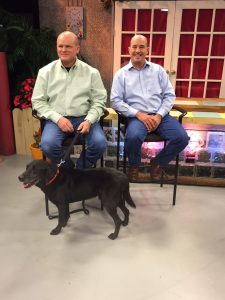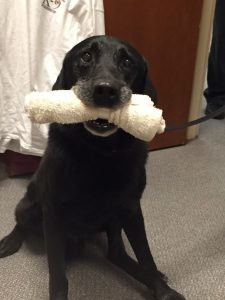 Florida growers have some new help with the fight on Citrus canker and Citrus greening (Huanglongabing-HLB). Dogs! And this time, they’re barking up the right tree.
Florida growers have some new help with the fight on Citrus canker and Citrus greening (Huanglongabing-HLB). Dogs! And this time, they’re barking up the right tree.
Canines now have been successfully trained to detect citrus canker and work currently is underway in training more dogs in detecting Citrus greening (HLB). This is exciting news for the citrus growers of Florida. Pepe Peruyero (pepedogs.com), owner of J&K Canine Academy Inc., in High Springs, FL, has developed a force of 10 dogs (4 in HLB detection) that are proficient in detecting canker in the diverse environments of packing houses, nurseries, and new and mature citrus groves. As Pepe describes, the training can take up to 4 months. The dogs initially are trained to imprint the odor of a canker lesion. But, the training doesn’t stop there as with most narcotic or bed bug detecting dogs. The challenge is to further teach them to detect canker in the field conditions of the citrus industry and grove setting.
Where does he get the dogs?
Pepe prefers training Labrador and Labrador mixes from rescue facilities for citrus canker scent detection. They tend to be larger in size and cover more ground in grove situations. Their web feet provide better traction in the sugar sand and have an easy disposition for this type of training.
Pepe has an Entomology background and nearly 20 years experience in dog handling. He explains that this revolutionary new method of sent detection has a ‘learning curve’. “One needs to maintain a high level of accuracy” he states. His training staff is made up of professional handlers from retired military and police forces. The many hours of training each day varies between 3-5 or more hours each day if the dog is receptive.
“The dogs love it”, he offers, “to save a dog labeled ‘poorly behaved’ at the dog pound, train him to work then watch him blossom is rewarding. The dog becomes giddy at the anticipation of a work day, they are exercised in the field, then, I watch him curl up at night and sleep soundly at the end of the day. It is quite gratifying”.
Why Citrus Greening?
Pepe has a passionate motivation for canker and HLB detection. “I remember having a significantly emotional feeling seeing the vast groves when I was young child”, he recalls. “Now, former groves are replaced with new housing developments.” “This method of scent detection is a tool for growers”. He adds, “I am doing this for growers not regulators”. “The use of these dogs has an ability to impact the citrus industry in Florida and potentially regain some of our ‘citrus image’ again”. Pepe currently is working with the United States Department of Agriculture (Tim Gottwald) and UF researchers and the citrus industry in Central Florida, Indian River, Vero and Ft. Pierce.
The most impressive success was when one of his dogs isolated a single fungal lesion on a 14 ft high leaf in a citrus grove. Whether it’s a trunk infection, foliar lesion or a systemic infection (symptomless), this pilot program seems to be working. Pepe indicated the current success rate of canker and HLB scent detection is over 90%. The dogs have been shown to be cost effective, reduce labor costs and most importantly, help with the detection of clean fresh fruit. Soon, canines will be known as ‘Florida’s best friend.’
 0
0
